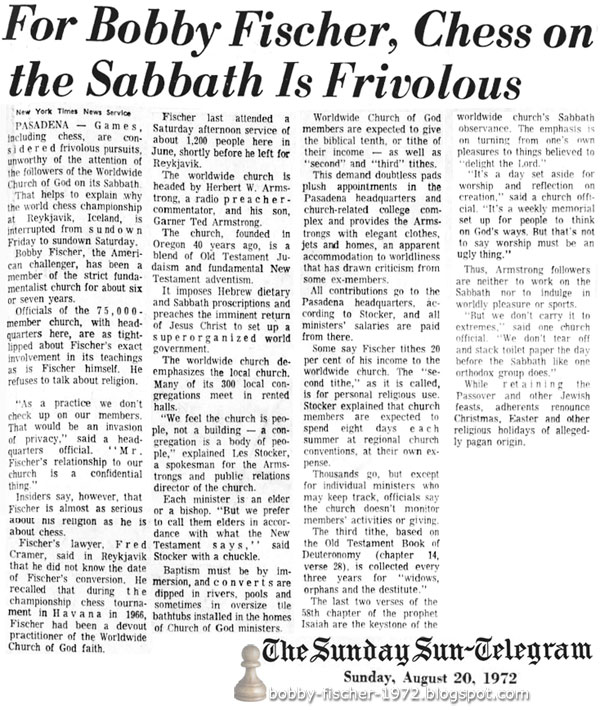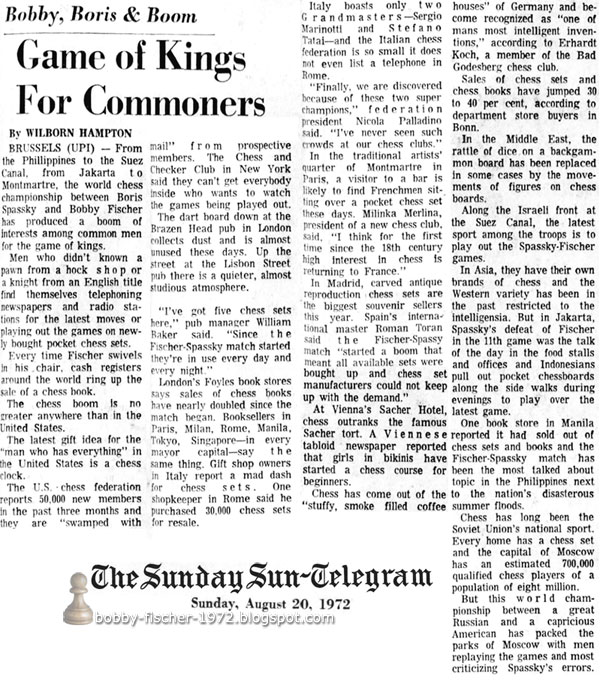The San Bernardino County Sun San Bernardino, California Sunday, August 20, 1972 - Page 15
For Bobby Fischer, Chess on the Sabbath Is Frivolous
Pasadena — Games, including chess, are considered frivolous pursuits, unworthy of the attention of the followers of the Worldwide Church of God on its Sabbath.
That helps to explain why the world chess championship at Reykjavik, Iceland, is interrupted from sundown Friday to sundown Saturday.
Bobby Fischer, the American challenger, has been a member of the strict fundamentalist church for about six or seven years.
Officials of the 75,000-member church, with headquarters here, are as tight-lipped about Fischer's exact involvement in its teachings as is Fischer himself. He refuses to talk about religion.
“As a practice we don't check up on our members. That would be an invasion of privacy,” said a headquarters official. “Mr. Fischer's relationship to our church is a confidential thing.”
Insiders say, however, that Fischer is almost as serious about his religion as he is about chess.
Fischer's lawyer, Fred Cramer, said in Reykjavik that he did not know the date of Fischer's conversion. He recalled that during the championship chess tournament in Havana in 1966, Fischer had been a devout practitioner of the Worldwide Church of God faith.
Fischer last attended a Saturday afternoon service of about 1,200 people here in June, shortly before he left for Reykjavik.
The worldwide church is headed by Herbert W. Armstrong, a radio preacher-commentator, and his son, Garner Ted Armstrong.
The church, founded in Oregon 40 years ago, is a blend of Old Testament Judaism and fundamental New Testament adventism.
It imposes Hebrew dietary and Sabbath proscriptions and preaches the imminent return of Jesus Christ to set up a superorganized world government.
The worldwide church de-emphasizes the local church. Many of its 300 local congregations meet in rented halls.
“We feel the church is people, not a building — a congregation is a body of people,” explained Les Stocker, a spokesman for the Armstrongs and public relations director of the church.
Each minister is an elder or a bishop. “But we prefer to call them elders in accordance with what the New Testament says,” said Stocker with a chuckle.
Baptism must be by immersion, and converts are dipped in rivers, pools and sometimes in oversize tile bathtubs installed in the homes of Church of God ministers.
Worldwide Church of God members are expected to give the biblical tenth, or tithe of their income — as well as “second” and “third” tithes.
This demand doubtless pads plush appointments in the Pasadena in the Pasadena headquarters and church-related college complex and provides the Armstrongs with elegant clothes, jets and homes, an apparent accommodation to worldliness that has drawn criticism from some ex-members.
All contributions go to the Pasadena headquarters, according to Stocker, and all ministers' salaries are paid from there.
Some say Fischer tithes 20 per center of his income to the worldwide church. The “second tithe,” as it is called, is for personal religious use. Stocker explained that church members are expected to spend eight days each summer at regional church conventions, at their own expense.
Thousands go, but except for individual ministers who may keep track, officials say the church doesn't monitor members' activities or giving.
The third tithe, based on the Old Testament Book of Deuteronomy (chapter 14, verse 28), is collected every three years for “widows, orphans and the destitute.”
The last two verses of the 58th chapter of the prophet Isaiah are the keystone of the worldwide church's Sabbath observance. The emphasis is on turning from one's own pleasures to things believed to “delight the Lord.”
“It's a day set aside for worship and reflection on creation,” said a church official. “It's a weekly memorial set up for people to think on God's ways. But that's not to say worship must be an ugly thing.”
Thus, Armstrong followers are neither to work on the Sabbath nor to indulge in worldly pleasure or sports.
“But we don't carry it to extremes,” said one church official. “We don't tear off and stack toilet paper the day before the Sabbath like one orthodox group does.”
While retaining the Passover and other Jewish feasts, adherents renounce Christmas, Easter and other religious holidays of allegedly pagan origin.
The San Bernardino County Sun San Bernardino, California Sunday, August 20, 1972 - Page 15
Bobby, Boris and Boom: Game of Kings For Commoners
By Wilborn Hampton
Brussels (UPI)—From the Philippines to the Suez Canal, from Jakarta to Montmartre, the world chess championship between Boris Spassky and Bobby Fischer has produced a boom of interests among common men for the game of kings.
Men who didn't know a pawn from a hock shop or a knight from an English title find themselves telephoning newspapers and radio stations for the latest moves or playing out the games on newly bought pocket chess sets.
Every time Fischer swivels in his chair, cash registers around the world ring up the sale of a chess book.
The chess boom is no greater anywhere than in the United States.
The latest gift idea for the “man who has everything” in the United States is a chess clock.
The U.S. chess federation reports 50,000 new members in the past three months and they are “swamped with mail” from prospective members. The Chess and Checker Club in New York said they can't get everybody inside who wants to watch the games being played out.
The dart board down at the Brazen Head pub in London collects dust and is almost unused these days. Up the street at the Lisbon Street pub there is a quieter, almost studious atmosphere.
“I've got five chess sets here,” pub manager William Baker said. “Since the Fischer-Spassky match started they're in use every day and every night.”
London's Foyles book stores says sales of chess books have nearly doubled since the match began. Booksellers in Paris, Milan, Rome, Manila, Tokyo, Singapore—in every major capital—say the same thing. Gift shop owners in Italy report a mad dash for chess sets. One shopkeeper in Rome said he purchased 30,000 chess sets for resale.
Italy boasts only two Grandmasters—Serio Marinotti and Stefano Tatai—and the Italian chess federation is so small it does not even list a telephone in Rome.
“Finally, we are discovered because of these two super champions,” federation president Nicola Palladino said. “I've never seen such crowds at our chess clubs.”
In the traditional artists' quarter of Montmartre in Paris, a visitor to a bar is likely to find Frenchmen sitting over a pocket chess set these days, Milinka Merlina, president of a new chess club, said, “I think for the first time since the 18th century high interest in chess is returning to France.”
In Madrid, carved antique reproduction chess sets are the biggest souvenir sellers this year. Spain's international master Roman Toran said the Fischer-Spassky match “started a boom that meant all available sets were bought up and chess set manufacturers could not keep up with the demand.”
At Vienna's Sacher Hotel, chess outranks the famous Sacher tort. A Viennese tabloid newspaper reported that girls in bikinis have started a chess course for beginners.
Chess has come out of the “stuffy, smoke filled coffee houses” of Germany and become recognized as “one of mans most intelligent inventions,” according to Erhardt Koch, a member of the Bad Godesberg chess club.
Sales of chess sets and chess books have jumped 30 to 40 per cent, according to department store buyers in Bonn.
In the Middle East, the rattle of dice on a backgammon board has been replaced in some cases by the movements of figures on chess boards.
Along the Israeli front at the Suez Canal, the latest sport among the troops is to play out the Spassky-Fischer games.
In Asia, they have their own brands of chess and the Western variety has been in the past restricted to the intelligentsia. But in Jakarta, Spassky's defeat of Fischer in the 11th game was the talk of the day in the food stalls and offices and Indonesians pull out pocket chessboards along the side walks during evenings to play over the latest game.
One book store in Manila reported it had sold out of chess sets and books and the Fischer-Spassky match has been the most talked about topic in the Philippines next to the nation's disastrous summer floods.
Chess has long been the Soviet Union's national sport. Every home has a chess set and the capital of Moscow has an estimated 700,000 qualified chess players of a population of eight million.
But this world championship between a great Russian and a capricious American has packed the parks of Moscow with men replaying the games and most criticizing Spassky's errors.

























